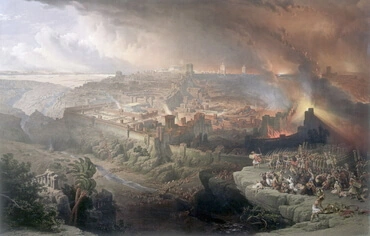The Inner Meaning of the Prophets and Psalms #127
127. Internal Meaning of Ezekiel, Chapter 4
Representation of the perverted church in the church. (2)
1-2 He should represent the falsities of the church, and the church besieged by them. (2)
3 He should represent the hardness of their heart, from which it is that they have no fear; (2)
4-8 he should also represent the church besieged by falsities of evil and evils of falsity. (2)
9-16 He should represent the falsification and adulteration of the sense of the letter of the Word, (2)
City

In the ancient world cities were nearly nations unto themselves – they existed within walls, with their own laws and customs, generally centered on the common purpose of trade. This is not as much the case in the modern world, but we still tend to divide ourselves city by city in terms of sports teams, accents, music and culture, and still tend to generalize the character of people from other cities. It follows, then, that in the Bible cities represent various doctrines – collections of inter-related ideas about spiritual reality. Such doctrines can be based on anything from the Lord’s true teachings – the New Jerusalem seen by John in Revelation – to the falsity and heresy of Sodom and various cities obliterated by the people of Israel at God’s command. On the most personal level, a city can also represent the natural mind of one person – which makes sense since we each to some extent have our own doctrine and our own set of ideas and beliefs.






